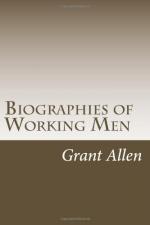In the year 1858 the untiring shoemaker had gathered his third and last collection, the finest and best of all. By this time he had become an expert stuffer of birds, and a good preserver of fish and flowers. But his health was now beginning to fail. He was forty-four, and he had used his constitution very severely, going out at nights in cold and wet, and cheating himself of sleep during the natural hours of rest and recuperation. Happily, during all these years, he had resisted the advice of his Scotch labouring friends, to take out whisky with him on his nightly excursions. He never took a drop of it, at home or abroad. If he had done so, he himself believed, he could not have stood the cold, the damp, and the exposure in the way he did. His food was chiefly oatmeal-cake; his drink was water. “Sometimes, when I could afford it,” he says, “my wife boiled an egg or two, and these were my only luxuries.” He had a large family, and the task of providing for them was quite enough for his slender means, without leaving much margin for beer or whisky.
But the best constitution won’t stand privation and exposure for ever. By-and-by Edward fell ill, and had a fever. He was ill for a month, and when he came round again the doctor told him that he must at once give up his nightly wandering. This was a real and serious blow to poor Edward; it was asking him to give up his one real pleasure and interest in life. All the happiest moments he had ever known were those which he had spent in the woods and fields, or among the lonely mountains with the falcons, and the herons, and the pine-martens, and the ermines. All this delightful life he was now told he must abandon for ever. Nor was that all. Illness costs money. While a man is earning nothing, he is running up a doctor’s bill. Edward now saw that he must at last fall back upon his savings bank, as he rightly called it—his loved and cherished collection of Banffshire animals. He had to draw upon it heavily. Forty cases of birds were sold; and Edward now knew that he would never be able to replace the specimens he had parted with.
Still, his endless patience wasn’t yet exhausted. No more of wandering by night, to be sure, upon moor or fell, gun in hand, chasing the merlin or the polecat to its hidden lair; no more of long watching after the snowy owl or the long-tailed titmouse among the frozen winter woods; but there remained one almost untried field on which Edward could expend his remaining energy, and in which he was to do better work for science than in all the rest— the sea.




